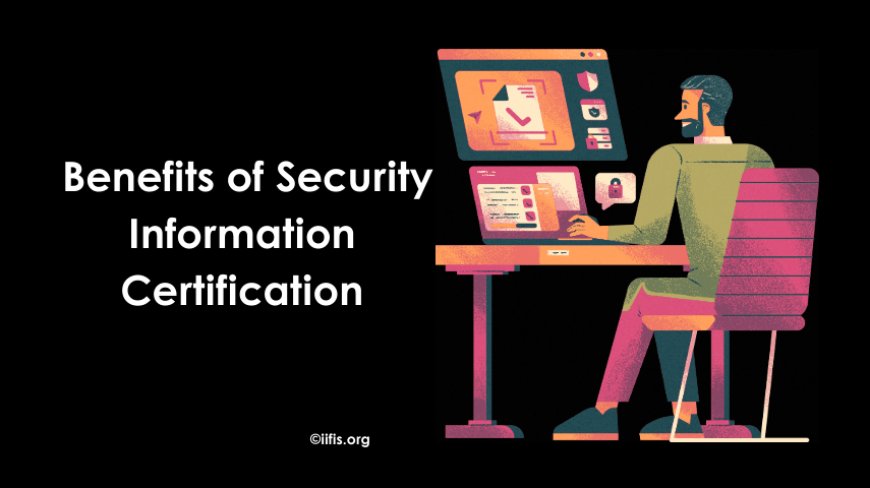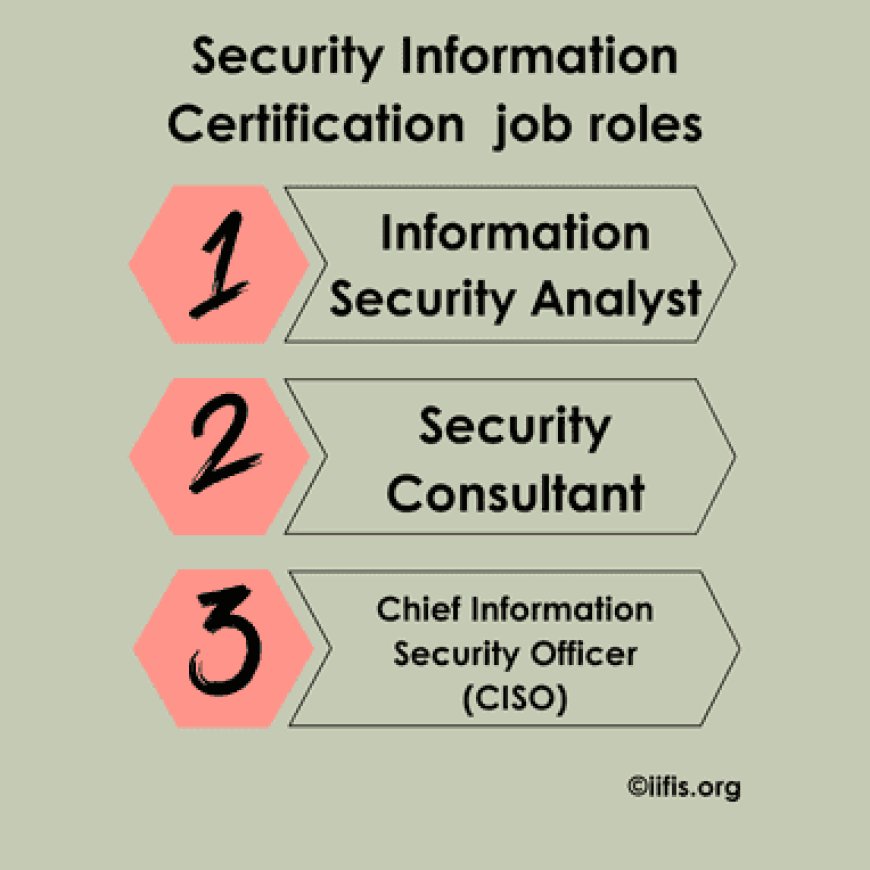Top Benefits of Security Information Certification
Discover the top benefits of Security Information Certification, including enhanced skills, credibility, career growth, and the ability to tackle emerging cyber threats.

In an era where cyber threats are constantly evolving, securing sensitive information has become a top priority for organizations worldwide. Earning a Security Information Certification can significantly improve your ability to protect digital assets and protect against data violations. This certification not only validates your expertise in information security but also opens doors to advanced career opportunities. Whether you’re an IT professional or looking to specialize in cybersecurity, obtaining a Security Information Certification equips you with the critical skills needed to stay ahead in the ever-changing world of digital security.
Importance of Information Security
As digital transformation grows across industries, the importance of information security has never been more critical. The rise in cyberattacks, data breaches, and advanced hacking techniques puts sensitive business and personal data at constant risk. Organizations must prioritize securing their systems to protect not only their assets but also their reputation and customer trust. With regulations tightening and threats evolving, maintaining strong information security practices has become a core requirement for businesses of all sizes.
Security Information Certification becomes invaluable, offering specialized training that improves the expertise of security professionals. These certifications cover a range of skills, including identifying and mitigating risks, implementing advanced security protocols, managing network weaknesses, and responding to security incidents. They also keep professionals updated on the latest security trends, technologies, and regulatory requirements. For both individuals and organizations, such certifications ensure that teams have the technical knowledge to bolster digital infrastructures, reduce the likelihood of violations, and comply with industry standards, ultimately strengthening overall security.
What is Security Information Certification?
Security Information Certification is a specialized credential designed to validate the expertise of professionals in safeguarding information systems and data. Its primary purpose is to equip individuals with the skills needed to protect organizations from cybersecurity threats, manage risks, and ensure compliance with industry regulations.
Key Areas Covered in the Certification
-
Risk Management: Identifying, assessing, and mitigating risks to minimize potential security threats.
-
Threat Analysis: Understanding various types of cyber threats and implementing strategies to detect, prevent, and respond to them.
-
Incident Response: Developing and executing effective responses to security breaches and minimizing their impact.
-
Compliance: Ensuring adherence to relevant security standards and regulations to avoid legal and financial penalties.
Recognized Institutions Offering Security Certifications
-
IIFIS (International Institute for Information Security): Offers globally recognized certifications in information security.
This certification is highly regarded in the industry and provides professionals with the credentials to advance their careers in information security.
Top Benefits of Security Information Certification
improved Knowledge and Skills
-
In-Depth Understanding of Information Security Principles
Security Information Certification provides a comprehensive foundation in essential information security concepts, including risk management, threat analysis, and compliance. This knowledge equips professionals to effectively identify weakness and implement appropriate security measures. -
Hands-On Experience with Security Tools and Techniques
Many certification programs highlight practical training, allowing candidates to gain hands-on experience with various security tools and techniques. This practical application helps professionals develop the skills needed to manage real-world security challenges, enabling them to respond effectively to incidents and protect organizational assets.
By obtaining a Security Information Certification, professionals can improve their capabilities and become valuable assets to their organizations, promoting improved security outcomes.
Career Advancement Opportunities
Increased Demand for Certified Security Professionals
The rising number of cyber threats has created a significant demand for certified security professionals. Organizations are increasingly prioritizing cybersecurity, leading to a greater need for experts who can protect sensitive information and ensure compliance with regulations. This trend is expected to continue, making certified professionals highly sought after in the job market.
Job Roles and Industries That Value the Certification
Security Information Certification opens doors to various job roles, including:

- Information Security Analyst: Focuses on monitoring and protecting an organization’s systems.
-
Security Consultant: Advises businesses on best practices for securing their information assets.
-
Chief Information Security Officer (CISO): Oversees an organization’s overall security strategy.
Industries such as finance, healthcare, government, and technology particularly value these certifications due to the sensitive nature of the data they handle.
Higher Salary Potential and Career Growth
Certified security professionals often enjoy higher salary potential compared to their non-certified counterparts. Entry-level positions can command salaries in the range of ₹5 to ₹10 lakhs per annum, while experienced professionals and those in leadership roles can earn ₹15 lakhs or more, depending on their experience and the complexity of the roles. The certification not only enhances earning potential but also provides a clear pathway for career growth, enabling professionals to advance into senior roles and leadership positions in cybersecurity.
Industry Recognition and Credibility
How Certification Validates Your Expertise
Security Information Certification serves as a formal validation of your knowledge and skills in information security. By completing rigorous training and passing certification exams, you demonstrate a high level of expertise that employers recognize and value. This validation can significantly enhance your professional reputation within the industry.
Standing Out Among Peers and Gaining Trust from Employers
In a competitive job market, holding a recognized certification helps you stand out from your peers. Employers often prioritize candidates with certifications, viewing them as more committed to their professional development and knowledgeable about industry best practices. This trust can lead to more job opportunities and career advancement.
Keeping Up with Emerging Threats
Staying Updated on the Latest Cyber Threats and Security Measures
The field of cybersecurity is constantly evolving, with new threats emerging regularly. Certification programs often include ongoing education components, ensuring that certified professionals stay informed about the latest vulnerabilities, attack vectors, and security technologies. This knowledge is crucial for effectively defending against contemporary threats.
Ability to Implement Cutting-Edge Security Strategies
With a strong foundation in current security practices, certified professionals can implement advanced security strategies tailored to their organization’s specific needs. This ability to apply cutting-edge solutions enhances the overall security posture of an organization and helps mitigate potential risks.
Compliance with Industry Standards
Importance of Meeting Regulatory and Compliance Requirements
In today’s regulatory environment, organizations must adhere to various industry standards and compliance requirements, such as GDPR, HIPAA, and PCI-DSS. Non-compliance can result in hefty fines and reputational damage, making it essential for companies to ensure their security practices meet these standards.
How Certification Ensures Adherence to Best Practices
Security Information Certifications provide training on compliance requirements and best practices, equipping professionals with the knowledge to implement effective security measures that align with industry regulations. By Observing to these standards, organizations can protect sensitive data, minimize legal risks, and foster trust with clients and stakeholders.
How to Choose the Right Security Information Certification
Factors to Consider When Selecting a Certification Course
-
Reputation: Choose certifications from recognized and reputable organizations.
-
Course Content: Ensure it covers essential topics like risk management and compliance.
-
Delivery Format: Opt for online, in-person, or hybrid formats that suit your learning style.
-
Cost and Duration: Consider your budget and the time commitment required.
Popular Certifications to Explore
-
CISSP: A comprehensive certification from (ISC)² for experienced professionals.
-
CISM: Focuses on management aspects, offered by ISACA.
-
Security+: An entry-level certification from CompTIA, ideal for beginners.
-
CEH: Specializes in ethical hacking techniques.
Tips for Maximizing the Benefits of Your Certification
-
Engage with the Community: Network with other professionals for insights and opportunities.
-
Apply Your Knowledge: Implement what you learn in your job or projects to reinforce skills.
-
Stay Current: Attend workshops and webinars to keep up with industry trends.
-
Renew Your Certification: Fulfill ongoing education requirements to maintain your credential.
By considering these factors and actively engaging with your certification, you can effectively improve your career in information security.
Obtaining a Security Information Certification offers significant benefits, including improved knowledge of cybersecurity, increased job opportunities, and greater credibility in the field.These certifications empower you to tackle emerging threats and advance your career.
I encourage you to pursue certification to improve your career prospects and strengthen your organization's security posture. Consider exploring programs offered by IIFIS (International Institute for Information Security) to find the right fit for your goals.























